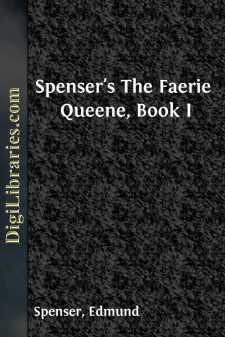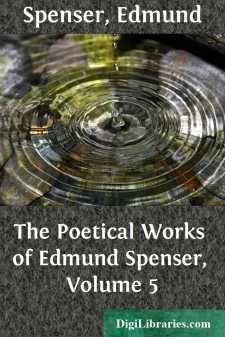Categories
- Antiques & Collectibles 13
- Architecture 36
- Art 48
- Bibles 22
- Biography & Autobiography 813
- Body, Mind & Spirit 142
- Business & Economics 28
- Children's Books 14
- Children's Fiction 11
- Computers 4
- Cooking 94
- Crafts & Hobbies 4
- Drama 346
- Education 46
- Family & Relationships 57
- Fiction 11829
- Games 19
- Gardening 17
- Health & Fitness 34
- History 1377
- House & Home 1
- Humor 147
- Juvenile Fiction 1873
- Juvenile Nonfiction 202
- Language Arts & Disciplines 88
- Law 16
- Literary Collections 686
- Literary Criticism 179
- Mathematics 13
- Medical 41
- Music 40
- Nature 179
- Non-Classifiable 1768
- Performing Arts 7
- Periodicals 1453
- Philosophy 64
- Photography 2
- Poetry 896
- Political Science 203
- Psychology 42
- Reference 154
- Religion 513
- Science 126
- Self-Help 84
- Social Science 81
- Sports & Recreation 34
- Study Aids 3
- Technology & Engineering 59
- Transportation 23
- Travel 463
- True Crime 29
Spenser's The Faerie Queene, Book I
by: Edmund Spenser
Description:
Excerpt
INTRODUCTION
I. THE AGE WHICH PRODUCED THE FAERIE QUEENE
The study of the Faerie Queene should be preceded by a review of the great age in which it was written. An intimate relation exists between the history of the English nation and the works of English authors. This close connection between purely external events and literary masterpieces is especially marked in a study of the Elizabethan Age. To understand the marvelous outburst of song, the incomparable drama, and the stately prose of this period, one must enter deeply into the political, social, and religious life of the times.
The Faerie Queene was the product of certain definite conditions which existed in England toward the close of the sixteenth century. The first of these national conditions was the movement known as the revival of chivalry; the second was the spirit of nationality fostered by the English Reformation; and the third was that phase of the English Renaissance commonly called the revival of learning.
The closing decade of Queen Elizabeth's reign was marked by a strong reaction toward romanticism. The feudal system with its many imperfections had become a memory, and had been idealized by the people. The nation felt pride in its new aristocracy, sprung largely from the middle class, and based rather on worth than ancestry. The bitterness of the Wars of the Roses was forgotten, and was succeeded by an era of reconciliation and good feeling. England was united in a heroic queen whom all sects, ranks, and parties idolized. The whole country exulting in its new sense of freedom and power became a fairyland of youth, springtime, and romantic achievement.
Wise and gallant courtiers, like Sidney, Leicester, and Raleigh, gathered about the queen, and formed a new chivalry devoted to deeds of adventure and exploits of mind in her honor. The spirit of the old sea-kings lived again in Drake and his bold buccaneers, who swept the proud Spaniards from the seas. With the defeat of the Invincible Armada, the greatest naval expedition of modern times, the fear of Spanish and Catholic domination rolled away. The whole land was saturated with an unexpressed poetry, and the imagination of young and old was so fired with patriotism and noble endeavor that nothing seemed impossible. Add to this intense delight in life, with all its mystery, beauty, and power, the keen zest for learning which filled the air that men breathed, and it is easy to understand that the time was ripe for a new and brilliant epoch in literature. First among the poetic geniuses of the Elizabethan period came Edmund Spenser with his Faerie Queene, the allegory of an ideal chivalry.
This poem is one of the fruits of that intellectual awakening which first fertilized Italian thought in the twelfth century, and, slowly spreading over Europe, made its way into England in the fifteenth century. The mighty impulse of this New Learning culminated during the reign of the Virgin Queen in a profound quickening of the national consciousness, and in arousing an intense curiosity to know and to imitate the rich treasures of the classics and romance....



